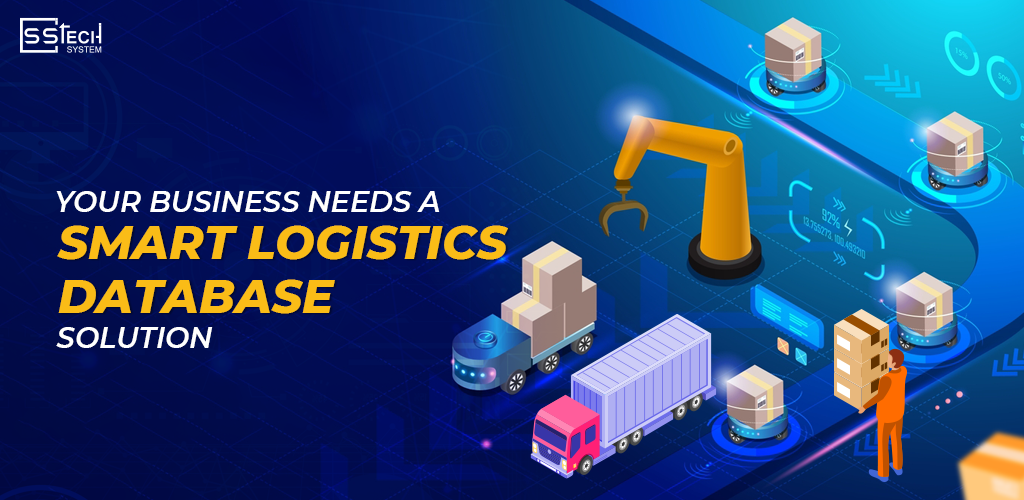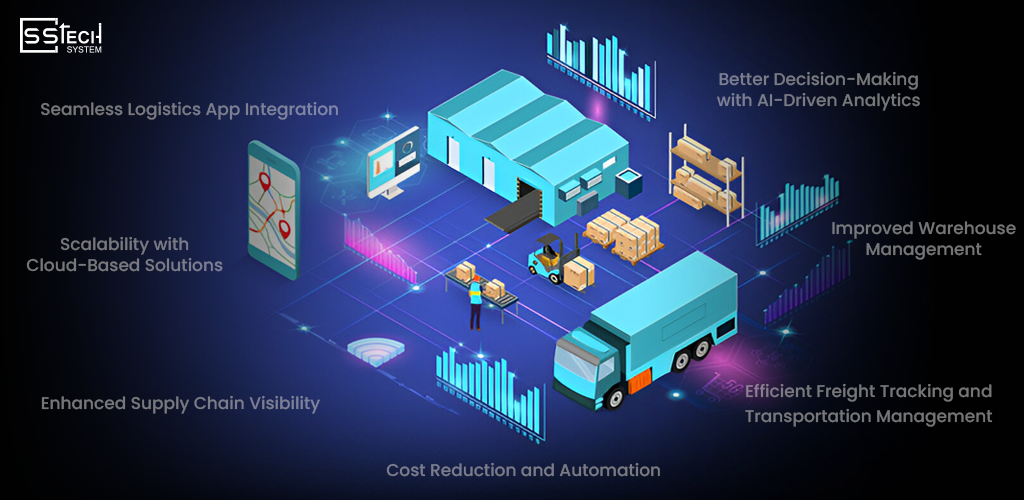
Logistics has become an essential factor in today’s dynamic business world since it is responsible for the efficient flow of products and services. Manual handling or the use of outdated systems in logistics can cause a lot of problems such as delays and increased costs. This is where a logistics database solution can be of great help as it offers a system that enables businesses to manage the supply chain data in a proper manner.
As the concept of digital logistics management emerges, companies are now using cloud-based logistics software, AI-powered logistics management, and logistics database analytics. With the help of a smart logistics database, companies can track the freight, manage the warehouse, and monitor the supply chain while enhancing operational efficiency.
What Is a Logistics Database Solution?
The e-commerce logistics market is expected to reach more than $535 billion by 2025, which indicates the growing need for effective logistics services in the online shopping industry. A logistics database solution is a specific kind of system that is designed to manage and sort out logistics information. It works with logistics software solutions to enhance supply chain processes, monitor freight, and manage a warehouse. Below are its key components:
-
Supply Chain Logistics Database
A supply chain logistics database consolidates data concerning various stages of a supply chain to provide real-time information. It assists companies in managing stocks, purchasing, and minimizing delivery time. This means that when a company integrates the demand forecasting with a logistics database tracking system, the overall supply chain will be boosted.
-
Warehouse Database System
A warehouse database system is a form of database that manages the stock levels, storage location, and movement of stock. This system helps to minimize the stock differences, automates the restocking process and optimizes the warehouse operations. With the help of cloud logistics database technology, it becomes easy for businesses to control several warehouses at once and track them in real time.
-
Freight Tracking System
The freight tracking system is a tool that helps track and monitor the shipment of consignments in real time. This system provides accurate delivery updates, optimizes routes, and helps in improving the satisfaction of the customers. Applying AI-driven analytics, one can forecast possible shipping delays and improve transportation management.
-
TMS Database Solution
A TMS database solution (Transportation Management System) is a software that assists companies in handling the fleet, routes, and carriers. It automates freight billing, optimises the load and enhances the efficiency of the delivery. Logistics database reporting helps businesses to be informed on the cost of transportation and other performance factors.
-
E-commerce Logistics Database
An e-commerce logistics database helps to manage orders, track shipments and deliveries. It connects with logistic app integration tools to enable the customers to have the real-time status of their order. Thus, utilizing automated logistics solutions, the problems of delivery errors can be eliminated, and customers’ satisfaction level can be increased.
Key Benefits of a Smart Logistics Database Solution

-
Enhanced Supply Chain Visibility
A supply chain logistics database enhances the tracking of shipment, inventory, and delivery in real-time. This way, businesses get a clearer view of the logistics operations, thus eliminating the chances of delay and poor routes.
With logistics database integration, all the data pertaining to the supply chain is stored in a common database, which is easy to handle. Implementing a smart logistics database can help in increasing the visibility of the supply chain operations, minimize wastage, and deliver products on time to the customers.
-
Improved Warehouse Management
A warehouse database system is used in managing the stock, storage space, and orders of a business. With the help of logistics database tracking, companies will be able to track the movement of stocks, avoid stock-outs and automate the process of restocking.
AI-driven analytics in warehousing help in managing operations and optimizing the use of space. Logistics database reporting helps in performance analysis, reduction of mistakes, and improving the storage infrastructure for efficiency and cost reduction.
-
Efficient Freight Tracking and Transportation Management
Real-time tracking of shipments is made possible by a freight tracking system that is linked to a TMS database solution. AI in logistics can help to minimize the cost of fuel, find the best routes, and deliver goods faster.
There are various types of logistics software solutions that help in the automation of transportation and improving the efficiency of the fleet. A smart logistics database makes it easier to have well-coordinated carriers, hence enhancing shipments and reducing transit time.
-
Seamless Logistics App Integration
A mobile application integration feature enables businesses to use their logistic database solution on their mobile gadgets. This makes it possible to update the managers and drivers instantly concerning the shipment status and any change in the route plan.
Remote access is a major advantage that is offered by the cloud-based logistics software. SSTech System Logistics Solutions helps companies to have a smooth flow of their data between the applications to facilitate their logistics.
-
Cost Reduction and Automation
An automated logistics solution eliminates human errors and provides the capability to automate the logistics process which helps to cut operational expenses. Companies reduce their costs by making the most of the data in the supply chain, increasing order precision and cutting waste.
AI-based analysis enables demand forecasting and minimizes the problem of excessive or insufficient inventory. Thus, a cloud logistics database helps to scale the business without investments in expensive equipment, which will provide long-term cost-effectiveness and operational sustainability.
-
Scalability with Cloud-Based Solutions
A cloud-based logistics software solution provides flexibility for companies to extend their operations without having to invest heavily in infrastructure. Cloud logistics database integration can help organizations to handle big data and real-time updates without negatively impacting performance. Cloud solutions also improve security, which means that the logistics data is safe from cyber risks.
-
Better Decision-Making with AI-Driven Analytics
Businesses can analyze trends, identify inefficiencies, and make data-driven decisions for process improvements. Logistics database reporting provides valuable insights into delivery times, cost management, and fleet performance. With AI-powered logistics management, companies can anticipate supply chain disruptions, enhance delivery accuracy, and improve overall logistics efficiency through smarter, data-backed strategies.
How AI is Transforming Logistics Database Solutions
-
AI-Powered Logistics Management
AI improves logistics management through decision-making, supply chain management and minimizes the roles of human beings in the process. AI enhances logistics database reporting by integrating real-time data, reducing delivery delays, and improving customer satisfaction. It also supports accurate demand forecasting to prevent overstocking or shortages in warehouse systems.
-
Real-Time Logistics Database Insights
AI improves the real-time logistics database through processing data from IoT devices, GPS and RFID tags. This makes it possible for businesses to monitor the movement of their consignments with a lot of accuracy, space management in their warehouses as well as management of their fleets. Logistics database integration using artificial intelligence makes it possible for logistics teams to be notified of any delay, change in the route, or any supply chain disruption.
-
Cloud Logistics Database for Enhanced Efficiency
Cloud logistics database solutions are cost-effective and secure means of managing logistics data. AI increases the efficiency of cloud logistics by providing automated data sharing, tracking, and remote access. The use of AI in the logistics database helps to optimize business processes, ensure the security of data, and increase cooperation between logistics and supply chain management participants.
-
Predictive Analytics for Supply Chain Optimization
AI-driven logistics database analytics use historical data to predict future supply chain trends. This is helpful in deciding on the route to follow, demand planning and inventory control in organizations.
Companies that implement AI in their supply chain database solutions gain valuable real-time information, reduce transportation expenses, and boost overall performance. AI also enables them to predict and control risks, allowing businesses to resolve logistics issues before they escalate.
-
Automated Logistics Solution for Error Reduction
AI deals with routine work like order management, shipment, and logistics database tracking and thus eliminates human error. Automated logistics solutions reduce data entry errors, streamline schedules, and ensure seamless software integration. They cut operational costs while boosting logistics efficiency and productivity.
Conclusion
A smart logistics database is not just an option; rather, it has become a necessity for companies that aim to enhance the supply chain, reduce costs, and make more informed decisions. Therefore, leveraging AI in logistics management, integrating cloud logistics databases, and utilizing logistics database analytics can significantly improve logistics performance.
SSTech Logistics Database and custom software solutions provide companies with an opportunity to integrate the logistics database into their business processes and track the shipment in real-time. In the long run, it will be important to invest in a logistics database solution to gain a competitive edge.
FAQs:
-
What is the importance of a logistics database solution?
A logistics database solution helps businesses manage, track, and analyze logistics data, improving efficiency, transparency, and decision-making.
-
What industries benefit the most from a smart logistics database?
Industries such as e-commerce, manufacturing, retail, healthcare, and third-party logistics providers (3PL) benefit from logistics software solutions for optimized supply chain management.
-
How can businesses integrate logistics database solutions with existing software?
Integrate logistics databases with ERP, CRM, and cloud systems to streamline operations and create a unified logistics software solution.
-
Can a logistics database solution help with regulatory compliance?
Yes, logistics database reporting ensures businesses adhere to industry regulations, tracking compliance-related data in real time.
-
What are the future trends in logistics database solutions?
Emerging trends include AI-powered automation, IoT-based logistics database tracking, blockchain for secure transactions, and cloud logistics databases for scalability.



